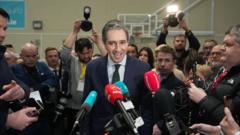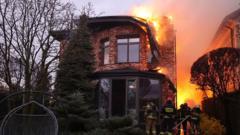Irish General Election: A Close and Competitive Race
The Irish general election is proving to be an extraordinarily tight contest, with exit polls suggesting a close battle between the three major parties. Sinn Féin appears to be slightly ahead in first preference votes, challenging the traditional dominance of Fine Gael and Fianna Fáil.
Key party leaders, including Taoiseach Simon Harris (Fine Gael), Micheál Martin (Fianna Fáil), and Mary Lou McDonald (Sinn Féin), have all been elected in their respective constituencies. The election will see a record 174 Teachtaí Dála (TDs) elected across 43 constituencies, with 88 seats required for an overall majority.
The political landscape is complex, with several notable dynamics:
1. Government Formation Challenges
Both Fine Gael and Fianna Fáil have ruled out sharing power with Sinn Féin, leaving McDonald to explore alternative government formation strategies. She acknowledges there isn’t a “straightforward pathway” to forming a government and is considering options including a minority government with left-leaning parties and independent TDs.
2. Voting System
Ireland uses a proportional representation system called the single transferable vote. Voters rank candidates by preference, and seats are allocated through multiple counting rounds. This method can make the final seat allocations unpredictable and time-consuming.
3. Potential Complications
Early tallies suggest some government ministers might struggle to retain their seats. Fianna Fáil and Fine Gael are currently best positioned to return to government, potentially securing 75-80 seats, just short of a majority.
4. Emerging Political Narratives
An interesting subplot involves independent candidate Gerry Hutch, whose anti-establishment campaign appears to have attracted some voter support. This raises questions about the effectiveness of different political messaging strategies.
5. Future Outlook
The counting process is expected to be lengthy, potentially taking several days. Historically, government formation can be even more protracted – the previous election in 2020 took four months to resolve.
McDonald has also highlighted the potential for a referendum on Irish unity, suggesting there’s an “immediacy and urgency” for such a conversation. She claims to have discussed this with UK Labour leader Sir Keir Starmer.
The first meeting of the new Dáil is scheduled for 18 December, but coalition negotiations are unlikely to be completed by then. The official formation of a new government, involving a vote to install a new Taoiseach, is not expected before 2025.
As the votes continue to be counted, political observers and citizens alike are watching closely to see how this complex and competitive election will ultimately resolve.



